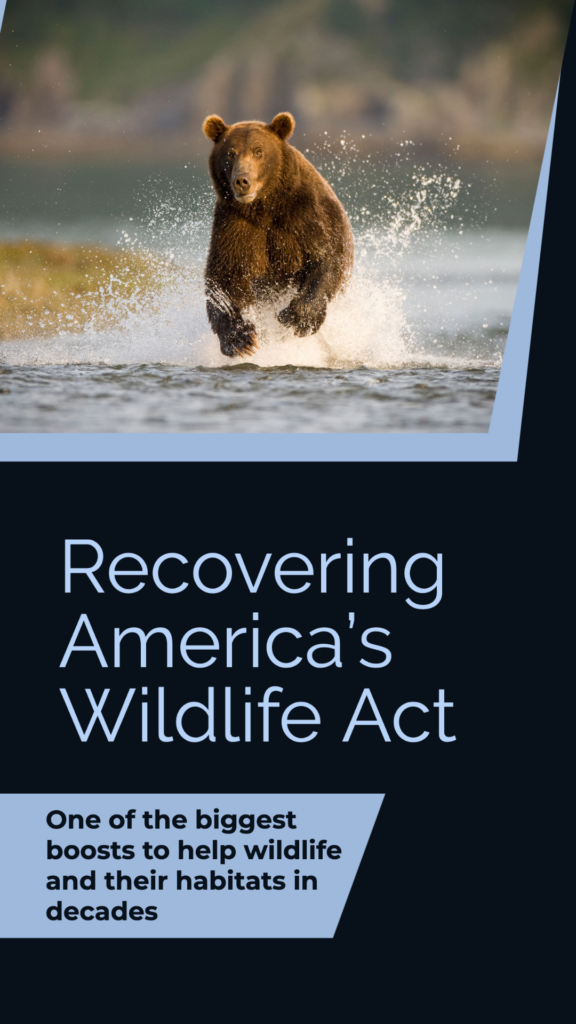Once-in-a-Lifetime Opportunity to Help America’s Wildlife
November 1, 2022

It’s been 15 years in the making and when it’s done, it will be one of the biggest funding boosts to help wildlife and their habitats in many, many decades.
The federal bipartisan Recovering America’s Wildlife Act (RAWA) will help conserve fish and wildlife in every state in the country, including many species that depend on the waters and riparian corridors of the Clark Fork watershed. Importantly, it creates a much needed mechanism for how fish and wildlife conservation is funded, ensuring we can act now – before these species become even more rare and more costly to protect.
This far-reaching legislation allocates $1.3 billion per year for state wildlife agencies to implement pro-active, non-regulatory actions to protect fish and wildlife. It also includes $97.5 million for tribal fish and wildlife managers to conserve fish and wildlife on tribal lands and waters. This means the critical work needed now to protect key habitats and species can be funded and implemented, instead of being delayed or – as often happens currently – never carried out.
RAWA has already passed the US House of Representatives and made it through the relevant Senate Committee. It is now before the full Senate. Prospects for passage look good, BUT, if it doesn’t pass by year’s end, we have to start all over in the House after the new Congress is sworn in. So your help is needed now!


You Can Help Wildlife
YOU can help ensure that the Recovering America’s Wildlife Act crosses the finish line!
If You Live in Montana

Contact our U.S. Senators from Montana—Senator Jon Tester and Senator Steve Daines—and ask them to vote YES for the Recovering America’s Wildlife Act.
Resources below to help you reach your senators. Your contact by website, e-mail, in person, or phone call will make a difference!
Senator Steve Daines
320 Hart Senate Office Building
Washington, DC 20510
(202) 224-2651
Email
Senator Jon Tester
311 Hart Senate Office Building
Washington, DC 20510
(202) 224-2644
Email
If You Live Outside Montana
You can look up your states’ U.S. Senators with the button below. Ask them to vote YES for the Recovering America’s Wildlife Act. Additional information and talking points here and below.

Recovering America’s Wildlife Act Talking Points
- THANK YOUR SENATOR for co-sponsoring RAWA if they are a co-sponsor (List of current Senate co-sponsors)
- List the many benefits of RAWA to your state:
- It helps conserve fish and wildlife and their habitats, helps ensure no species falls through the cracks, and helps prevent more endangered species listings
- It helps local economies by safeguarding high-quality outdoor recreation, benefiting pollinators to food supplies, and improving human health, well-being, and jobs
- It saves money. By benefiting at-risk species, it prevents them from being listed as Endangered or Threatened, preventing the highly costly measures needed to recover those species once they are listed.*
- It provides the funding needed to implement your state’s Wildlife Action Plan (many states have such plans, but no funding to implement them)
- It helps ensure that future generations can find the same enjoyment from fish and wildlife that past and current generations have (including your senator!)
- Remind your senator that RAWA enjoys overwhelming support across the country, with 86% of voters in favor of its passage (Data for Progress Sept. 2022 poll)
- Say that you need their help to get this unique, bi-partisan legislation across the finish line this fall.
* Defenders of Wildlife estimate that it costs the federal government more than $19 million on average to recover a species once listed under the Endangered Species Act (estimate as of 2019). If an additional 2,000 species need to be listed as endangered or threatened over the next 10 to 15 years, which is not unrealistic given that states have identified more than 12,000 species in conservation need, it would cost taxpayers an estimated $38 billion to recover these additional species. That $38 billion would be over and above what is still needed to recover the more than 1,660 U.S. species already on federal Endangered Species Act list—and that’s just the estimated cost to the federal government. States, territories, Tribal nations, would also bear some of the costs of recovering federal endangered and threatened species. There would also be significant impact on the private sector and private landowners, especially America’s farmers, ranchers, forest landowners, and builders, all of whom would face greater regulatory and economic uncertainty and tens of billions of dollars in costs.
